Can chickens eat lettuce? They can, but it’s not the best thing to eat. While some varieties contain nutrients beneficial to chickens, others are mostly water and fiber. Iceberg lettuce, in particular, is not very nutritious for chickens. Darker-colored varieties such as romaine and arugula are the best lettuce to feed your chickens.
It is important to provide variety in their diet and feed them a balanced meal. Lettuce should not be the main part of a chicken’s diet but should be used as a supplement. When feeding lettuce to chickens, ensure they have access to fresh water and other nutritious foods.
This article will discuss the benefits and risks of feeding lettuce to chickens, as well as other vegetables that are safe for them to consume. It will also provide tips on safely feeding chickens lettuce and other vegetables.
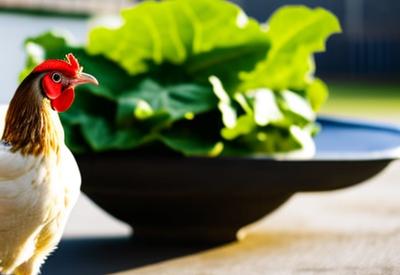
Can chickens eat lettuce?
The short answer is yes; chickens can eat lettuce. However, it is important to note that lettuce does not provide much nutrition for your chickens and should only be fed to them occasionally as a treat.
Chickens can eat most lettuce varieties, including romaine, butterhead, and iceberg. It is best to avoid iceberg lettuce as it is primarily composed of water and fiber and does not contain many nutrients.
Lettuce should only be fed to your chickens in moderation as it contains mostly water and few nutrients. You should limit the amount of lettuce you give your chickens to no more than 10% of their daily food intake; otherwise, they may become malnourished due to a lack of essential nutrients.
[ChickenAffiliate]
The benefits of eating lettuce for chickens
Fruits and vegetables are essential components of a healthy chicken diet, and lettuce can be an occasional good treat. Here we’ll explore just why lettuce benefits your chickens and what other vegetables you should feed them as part of their daily meals.
Nutrients in Lettuce
Lettuce is high in vitamins A, C, K, and B6, folate, magnesium, potassium, and calcium – all essential nutrients for the proper growth of chicken flocks. Vitamin A helps keep your chickens’ eyesight sharp while keeping their skin healthy.
Vitamin C boosts their immune system so they can avoid illness and disease. Vitamin K strengthens their bones, while B6 helps with red blood cell production. Lastly, the minerals in lettuce help with overall health maintenance in chickens.
A Good Source of Hydration
Chickens naturally love to eat greens due to their natural hydration content. Lettuce makes an excellent supplement to water consumption since it’s made up of 95% water.
Adding lettuce to your chickens’ diets will help them stay hydrated when they need it the most during the hot summer months.
Promotes Healthy Droppings
Lettuce can be used as a natural laxative for chickens since it contains dietary fiber, which helps keep their digestive systems running smoothly and efficiently.
Eating lettuce regularly can also reduce the number of smelly droppings your chickens produce since it binds with toxins from food waste and eliminates them from the body more quickly than other foods do.
A Great Treat
Chickens love to eat lettuce because it tastes great. It can also be served fresh or frozen – both options make for excellent treats for your flock that will keep them happy and healthy all year round.
Plus, it doesn’t take much time or effort to prepare; all you have to do is toss some chopped-up lettuce into their feeder or spread some frozen pieces on the ground around your coop area so they can enjoy snacking on it anytime they want.
Things to watch out for when feeding lettuce to chickens
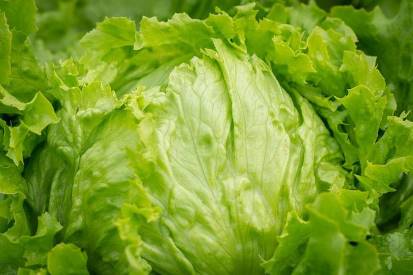
You need to watch out for a few things when feeding lettuce to your chickens. Here are three key considerations when adding lettuce to your chicken’s diet.
Feed in Moderation
Like with any other food, you should always feed lettuce in moderation. Too much lettuce can cause digestive issues in chickens and lead to problems like diarrhea.
As a rule of thumb, it’s best to feed no more than 10% of your chicken’s daily diet as lettuce. This will ensure they don’t become sick from consuming too much of it.
Watch for Pesticides
You should always be careful when feeding any produce to your chickens, and lettuce is no exception. Make sure the lettuce you are feeding them is grown without pesticides and is free from harmful chemicals or toxins before giving it to them.
Organic or homegrown lettuces are the best options for feeding your chickens.
High Water Content
Lettuce has a high water content which can cause issues if fed in large amounts as part of their regular diet. Eating too much lettuce can cause diarrhea in chickens due to its high water content, so ensure not to overfeed them with this vegetable.
The best way to avoid this issue is by only offering small amounts at a time and supplementing their diets with other grains and greens with less water content.
How often should chickens eat lettuce?
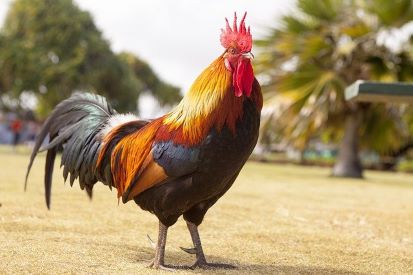
Generally speaking, feeding chickens lettuce is not recommended as a regular part of their diet. It’s important to provide a balanced and complete nutrient profile, so lettuce should be used only as an occasional treat. If chickens eat lettuce, it should not make up more than 10% of their overall diet.
Vegetables like kale, Swiss chard, and spinach are better suited to fulfill the nutritional needs of chickens. When adding lettuce to their diets, fresh or organic is preferable over packaged options, and be sure to wash away all dirt and pesticides before feeding any vegetable to them.
How to prepare lettuce for feeding to chickens
What’s the best way to prepare lettuce before giving it to your chickens? Here’s a short guide on how to get the most out of feeding lettuce to your feathered friends.
Wash First
The first step in preparing lettuce is washing it thoroughly with cold water. This will help remove any dirt or bacteria on the surface of the vegetable. It’s also important to ensure no pesticides or other chemicals present that could harm your chicken.
Small Amounts
When feeding lettuce to your chickens, it’s important not to give them too much at once. Too much lettuce can overwhelm their digestive system and cause digestive problems like diarrhea. So, start by giving small amounts and then increase as needed if you notice they enjoy it.
Remove Uneaten Pieces
As with all food, ensure that you remove pieces of lettuce that have been left uneaten after a few hours. This will help keep your coop clean and free from potential hazards caused by old food rotting away in the corner.
Can baby chickens eat lettuce?
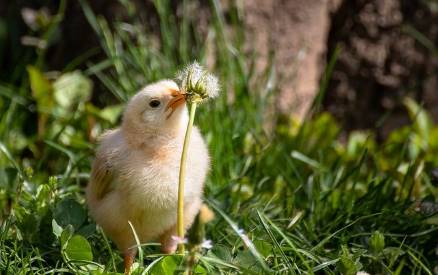
Yes, baby chickens can eat lettuce. However, it’s important to be mindful of the water content since they may consume too much if given large amounts. Baby chicks can only eat a fraction of what adult chickens would eat – lettuce included – so keep that in mind when offering treats to your young flock.
Lettuce can be a great supplement and treat for baby chickens, but as with all things, moderation is key.
What other leafy greens can chickens eat?
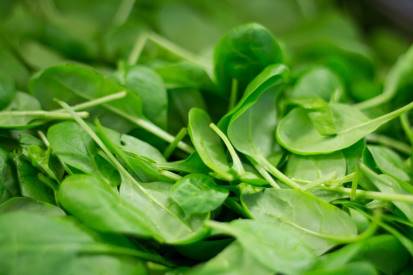
Lettuce may be one vegetable that comes to mind when it comes to a happy, healthy chicken. But there are many other leafy greens chickens can eat and enjoy. Let’s explore some leafy green veggies that make a great addition to your chicken’s diet.
Spinach
Spinach is one of the most nutrient-dense foods you can give your chickens, providing them with essential vitamins and minerals. It is also an excellent source of iron, helping keep your chickens strong and healthy.
The best way to feed spinach to your chickens is fresh or frozen; avoid giving them canned spinach as it contains too much salt for them.
Read More: Can Chickens Eat Spinach? 6 Important Benefits
Kale
Kale is loaded with vitamins A and C, calcium, and iron. In addition, kale provides more protein than other leafy greens, making it an excellent choice for your chickens.
You can either feed your chickens fresh kale or offer dehydrated kale chips as a fun treat now and then.
Read More: Can Chickens Eat Kale? 5 Fantastic Benefits
Arugula
Arugula is a great source of vitamin K, which helps with blood clotting in chickens. Arugula is also high in calcium which helps keep bones strong, and vitamin C, which helps boost the immune system.
Like kale, you can feed arugula fresh or dehydrated for a tasty snack.
Read More: Can Chickens Eat Arugula? 5 Amazing Benefits
Collard Greens
Collard greens are packed with vitamins A and C, which help support overall health in your flock. They also provide dietary fiber, which helps promote digestion in chickens and keeps their gut healthy.
As with the other leafy green vegetables mentioned here, you should feed collard greens fresh or frozen to ensure they are not too salty for consumption by your chicken friends.
Read More: Can Chickens Eat Collard Greens? 5 Excellent Benefits
Swiss Chard
Another excellent source of fiber, Swiss chard helps keep digestive systems running smoothly in your flock by aiding digestion and eliminating constipation issues in chickens. It provides Vitamin K for blood clotting and Vitamins A and C for immunity-boosting benefits.
Swiss chard can be fed fresh or frozen in small amounts for the best nutritional value.
Read More: Can Chickens Eat Swiss Chard? 5 Awesome Benefits
How to give chickens a healthy and balanced diet
As a chicken owner, you know how important it is to keep your feathered friends healthy and well-fed. But what does that mean? What are the essential components of a balanced diet for chickens? Well, let’s dive in and find out!
Grain Mixes & Pellets
Grain mixes and pellets should make up the bulk of your chickens’ diet; these provide energy and many essential vitamins and minerals. Depending on the age of your chickens, you may need to switch between different types of grain mixes or pellets.
For example, chicks often require a special feed formulated specifically for their dietary needs. On the other hand, adult chickens can thrive on a combination of grains and legumes like corn, oats, wheat, peas, soybeans, and barley.
Greens & Vegetables
Your chickens will love snacking on fresh greens like lettuce, spinach, kale, or broccoli now and then. Vegetables like carrots are also great treats; they’re packed full of antioxidants that help maintain eye health.
When giving your chickens vegetables or greens as snacks, chop them into small pieces so they can eat them easily.
Fruits
Fruits are another great way to add variety to your chickens’ diet. Apples are one of the most popular fruit snacks for chickens; make sure you cut them into small pieces, so your birds don’t choke on them.
Citrus fruits (like oranges) can be beneficial for your birds too; they contain lots of vitamins and taste delicious! Other good fruits for chickens include pears, melons (like watermelon), grapes, and strawberries.
Can chickens eat lettuce – final thoughts
In conclusion, lettuce can make a great treat for chickens and provide them with essential vitamins and minerals to stay healthy.
It’s important to remember always to feed lettuce – and any other produce – in moderation, watch for pesticides, and be aware of the high water content when offering it to your flock.
Following these guidelines ensures that lettuce is a safe and nutritious addition to your chickens’ diets.
Related Articles:
